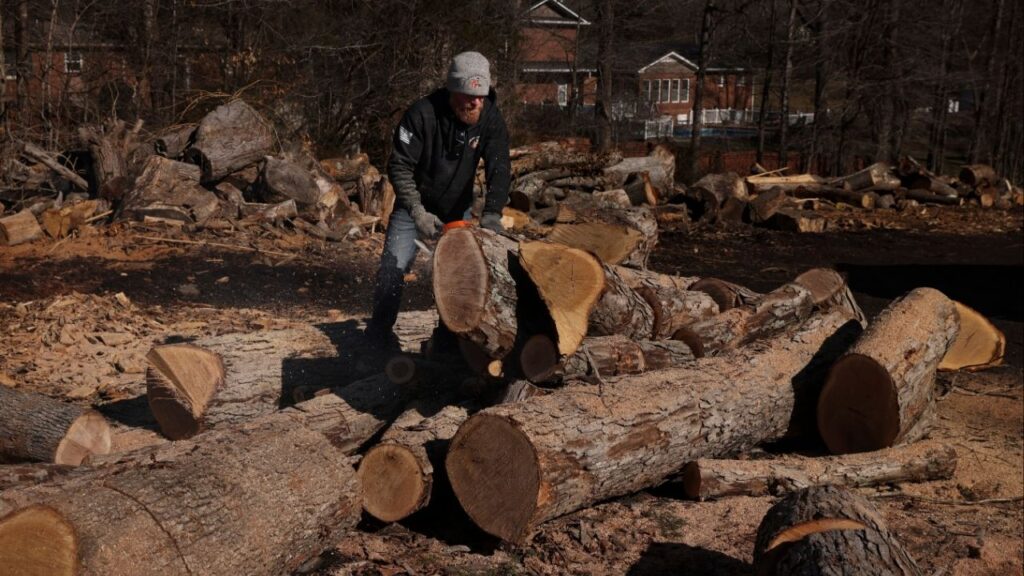Attendees at an election night event at Howard University in Washington, Nov. 5, 2024. (Damon Winter/The New York Times)
Share
|
Getting your Trinity Audio player ready...
|

Tressie McMillan Cottom
Opinion
I have always been audacious about Black women’s political aspirations. When I was 15 years old I decided to become a local pageant queen, a Carousel Princess, for our Thanksgiving Parade. It was an uncharacteristic choice. I was an oratory and student government kind of girl.
I don’t remember much about the pageant except the question portion, in which I was asked, “What do you want to be in the future?” I intended to be “the first Black female Supreme Court justice.” The emcee smiled indulgently. I stared defiantly.
Some 30 years later, Ketanji Brown Jackson took my Supreme Court justice job. And this week Vice President Kamala Harris almost became the first Black female president. Our policy differences aside, her ascendancy to the top of her party should have felt like the realization of my childhood dreams. Instead, for weeks I have felt isolated in my ennui.
As it turns out, Donald Trump was harder to vanquish than so many of us hoped. He won. And today it feels like his brand of identity politics is more audacious than my youthful dreams about a Black female president.
Related Story: Harris Calls President-Elect Trump to Congratulate Him on Win
The Monday night before Election Day, I drove to my nearby alma mater, North Carolina Central University, with an anxiety headache. In the words of Alice Walker, I went searching for my mother’s garden — a connection to the ancestral continuation of Black women’s survival and resilience. The campus has a polling place, perhaps in part because I helped organize one my sophomore year in college. It is where I cast my first vote for president.
This historically Black college campus in Durham, North Carolina — a Southern city that once had a “Black Wall Street” — is full of the ghosts of voter suppression and dogged Black resilience. It is also home to the ghost of my young, ambitious, audacious self.
As I walked across campus, I thought about the prospect of a Harris victory and wondered why I wasn’t more excited about the possibility of our first Black female president.
Kamala Harris embodies audacity even more than Barack Obama once did. Like Obama, she is of mixed race and identifies as Black. But she is also the child of two immigrants, and she is unquestionably a product of Black American institutions. She is a graduate of Howard University. A member of the first intercollegiate Black sorority, Alpha Kappa Alpha. An Oakland pedigree. And she has that silk press.
Related Story: Democrats Hoped Harris Would Rescue Them. On Wednesday, She Called Trump to ...
Women of color were among the last minority groups to get the right to vote. The fact that someone who represents those who were last to be included in American democracy came so close to saving this nation from its worst impulses is audacious, by any measure.
There will be a lot of accounting of why Harris came so close but did not close the deal.
I know two things today. I know the fundamentals of how and why Trump exists — I’ve written about them too many times to count — and I know that nothing about those fundamentals has changed.
I knew that a month ago. I knew it a week ago. I didn’t want to know it again today.
But this election was about enthusiasm and diagnoses. The long-term trajectory of our country has not changed. Millions of middle-class people feel working-class. These Americans have no way to describe what is happening to them. Is it the borders? Is it supposedly dangerous cities? The loss of God in the classroom? Cultural Marxism? Wokeism? Inflation? Tariffs? Women?
Nature abhors a vacuum. But political opportunists thrive in vacuums.
This election was about who told a better story about the fundamentals without promising anything to fix those fundamentals. That is the sweet spot for an opportunist like Trump and his party. Sell everything, promise nothing. Keep them coming back for more.
Related Story: The Latest: Trump and Harris Cede Stage to Voters Who’ll Also Decide ...
The Harris campaign countered with a relatively hopeful message about the future. But the candidate ultimately ran on a platform of stasis. Her promise was that nothing much would change about the country but the race and gender of the one in charge — and she didn’t even lean into a history-making narrative about her race and gender because it felt like a promise she could not keep. A promise of a more audacious America.
Maybe how she almost won is the reason she could not win.
I was never going to be a big fan of some of Harris’ politics. I do not believe in police reform and she is a “law and order” Democrat, for one example. But I am a pragmatic voter. I know that most Americans are center-right and that the left has not yet built the power base necessary to make most Americans center-left. She was always going to be the only legitimate candidate in a race against Donald Trump, a felon and self-aggrandizing political troll.
Perhaps more important, when she became the Democratic nominee, it did not feel like a conquest. It felt like a Hail Mary.
The stink of our national desperation has haunted me since Harris accepted the nomination. It called to mind how Black women become firsts in other arenas. Research shows that women often inherit leadership roles when organizations are in crisis. That kind of risk exposure is especially acute for women of color. Desperate companies and nonprofits blow through their wunderkind leaders and turn to women, who often have fewer organizations competing for their talents. They can get them at a good deal — female CEOs often make less than male CEOs. And when the organizational fractures are too deep to be fixed or the female leaders are given too little authority or resources to fix them, they are blamed for the failures they inherited.
It was a short election cycle. Harris didn’t have a victory lap after early primaries or on Super Tuesday. We did not get a chance to invest in Harris’ capabilities, only her willingness to inherit our broken mess. And the early forensics of her campaign read like a funeral program instead of a celebration of life.
Related Story: Harris Calls President-Elect Trump to Congratulate Him on Win
Notably, there are numerous obituaries for “identity politics” that argue that Harris’ decision to deemphasize her race and gender in her campaign means that diversity is dead as an overt political strategy. But what if she should have leaned into identity more, risking the white identity voter but telling us a clear story about why electing her would speak about our audacious potential?
We cannot know for sure. We do know that she declined to write the narrative of her historic firsts throughout her campaign, while Trump wrote the second volume of his story of which identities should matter most. Harris’ campaign positioned race and gender not as strengths to be reclaimed but flaws to be subsumed. If you have to hide the light of your race and gender behind the metaphorical bushes to come vaguely close to being the first Black female president, then identity still matters very much indeed.
Will more Black women run because of Kamala Harris? Almost definitely. Will more Black women win using Kamala Harris’ playbook? I hope not.
Black feminism — and especially the idea of intersectionality — became a pop culture cliché in the 2020s. But Harris took a more traditional second-wave feminist approach to her performance of womanhood. Her campaign did not challenge gender conventions so much as it selectively subverted some gender expectations (and left others intact) for her political benefit. She has this in common with Sarah Palin, another first who almost went the distance.
Related Story: Democrats Hoped Harris Would Rescue Them. On Wednesday, She Called Trump to ...
I always believed that a conservative woman would be the first female president because of what social science says about gender and leadership. American voters demand compensating qualities — gun-toting, conventional attractiveness, religiosity — to accept a female president. Harris played that game, finessing that hybrid centrist conservative in a progressive package. That feels like a game plan for the many female candidates who will follow in her footsteps. It is less clear to me that Harris’ game plan can ever actually work for a Black female candidate.
For one thing, Black women cannot usurp Palin’s gun-toting, America-first political shtick. Harris came close. On the trail, Harris (and running mate Tim Walz) talked about packing a gun the way women in politics were once expected to talk about packing their kids’ school lunches. She also delighted in being tough on crime. By pivoting to the right, Harris bet that American voters trust female politicians who present as culturally conservative, like Palin. Harris just did it from the Democratic ticket. That choice is part of her legacy.
What isn’t part of her legacy is the end of identity politics. Try as some might to bury the salience of race, class and gender to political life, identity still matters. And it mattered to Harris’ campaign. The devil is in how people misunderstand what identity politics is.
The common-sense understanding of identity politics is that it is rooted in the shared group identity based on linked oppressions. That link to oppression is key. It is why only minorities are thought to have an “identity” in identity politics.
Related Story: The Latest: Trump and Harris Cede Stage to Voters Who’ll Also Decide ...
If you think identity politics means “performing an identity,” then Harris bucked the progressive habit of leveraging identity politics. Someone looking to build on her campaign’s progress might think that Harris lost because she didn’t ham up the guns and nationalism enough and bury her identity even deeper.
That is wrong and it is racist. And it is also wrong because it is racist. It is racist to believe that racial identity is an affliction that only weak-willed or weak-minded minorities suffer. When we limit identity politics to minorities, we insist that in politics only nonwhite people have racial identities (and to a lesser extent, that only women have gendered identities). If you accept that everyone has a racial identity — which is very hard to refute — then every political individual engages in identity politics.
White voters are also identity voters. In fact, they are the most important of all identity-driven voters. It was their votes that Harris had to court.
I thought a lot this election season about a book by political scientist Ashley Jardina, “White Identity Politics,” published in 2019, that examines how much white racial attitudes are rooted in their white identity politics. Jardina’s data supports the theory that white voters feel, and therefore act, in ways that support their view of themselves as white. They are not necessarily prejudiced against minorities. In fact, Jardina argues that the empirical connection between prejudiced views and white identitarianism is pretty weak. A lot of white people don’t feel white and yet vote and act in racially prejudiced ways. And some white people feel white, vote from a white identity and do not particularly act in racially prejudiced ways.
White identity voters are not located just in conservative areas, like the South. They aren’t all Republicans or conservative voters or poor or working class. Jardina is clear that white identity politics has increased across the income, ideological and geographical spectra. Trump’s final electoral map picked up new voters, kept his core voters and found new identity voters — Latinos, Black men and immigrants.
Related Story: Harris Calls President-Elect Trump to Congratulate Him on Win
Harris may not have emphasized her own identity in her campaign but her campaign absolutely emphasized the interests of those white identity voters who may have leaned toward Trump in 2016. Those voters tend to be threatened by, and therefore obsessed with, immigration.
This was the source of candidate Harris’ hard center-right turn. Time and time again, she put her experience as a prosecutor and an attorney general forward when she talked about securing the border. She embraced American exceptionalism abroad and policing at home. She did not appear to kowtow to the Democratic Party’s left wing. Palestinian supporters did not succeed in getting a Palestinian speaker onstage at the Democratic National Convention. She did not utter now-toxic slogans like “abolish the police.” And she pushed back on those who tried to position her as a “DEI” (diversity, equity and inclusion) candidate.
Neoconservatives like Dick Cheney endorsed Harris not only because Trump is so dangerous; on issues like national and domestic security, it’s hard to pass a light between her positions and those of a typical conservative. The nation’s first Black woman on a national ticket tapped into the white identity voters’ nationalism. She pitched herself to the white identitarian coalition that Trump has played like a fiddle.
Related Story: Democrats Hoped Harris Would Rescue Them. On Wednesday, She Called Trump to ...
That is just more of the white identity politics on which American politics were built — and that the Black franchise should always be an indictment of. Obama’s coalition feels like an aberration and it is time for us to accept that American politics is identity politics. It is a battle for the identities that will be named and shamed, while others are granted anonymity and power. Playing to the silent white identitarian does not guarantee victory if you aren’t a white identity candidate. If we learn anything from Harris’ loss, it should be that we must stop sacrificing the power of other identities — their values, their hopes, their security — for a chance that will not pan out.
Black women have saved democracy enough times to deserve more than cosmetic diversity. We deserve more than hope and change. We deserve recognition and power. Above all, we deserve better than a post at the head of a sinking ship that reveres the iceberg.
All this isn’t to say the Harris campaign did not leave a mark. She proved the continuing importance of Black institutional life. The schools and churches and social groups that Black Americans cobbled together from the ashes of white violence and dispossession made her candidacy possible. Wealthy donors make you competitive. But a base makes you viable. Her competitiveness proved that Black culture can still make a powerful base.
Kamala Harris would not be the first Black female vice president were it not for Howard University, a historically Black college, and her affiliation with Alpha Kappa Alpha, a Black Greek-letter sorority. Even her political base in California’s Bay Area tapped into that area’s racial history — the Black migration that built racial enclaves that became microsites of political power.
Whether or not Harris’ campaign alters the political imagination for Black female electoral power, the institutions she has brought along with her just might.
But it won’t be today, and it won’t be this year.
–
This article originally appeared in The New York Times.
By Tressie McMillan Cottom/Damon Winter
c. 2024 The New York Times Company



















